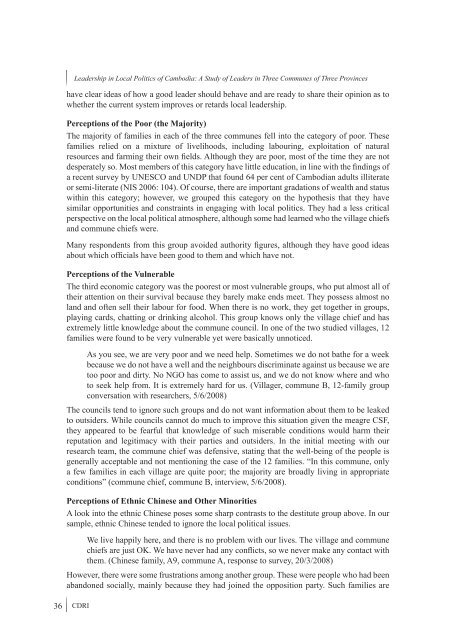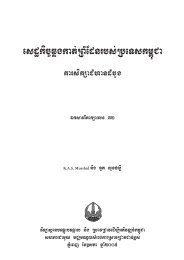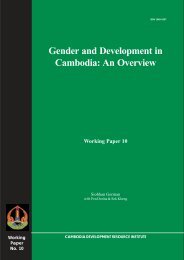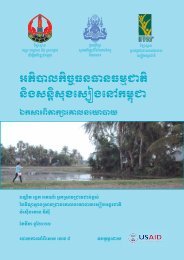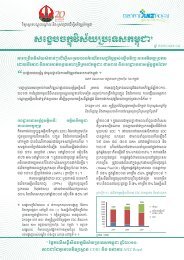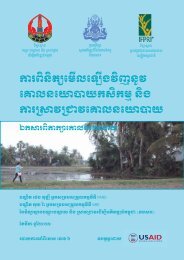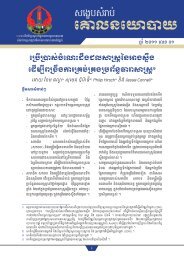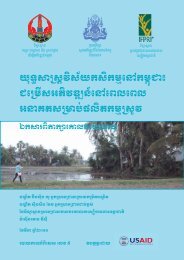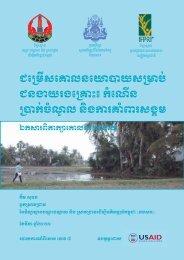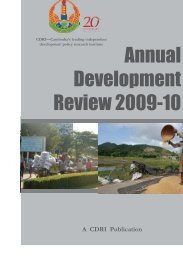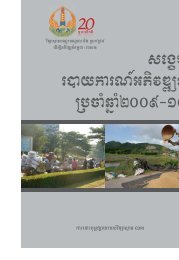Leadership in Local Politics of Cambodia: A Study of ... - CDRI
Leadership in Local Politics of Cambodia: A Study of ... - CDRI
Leadership in Local Politics of Cambodia: A Study of ... - CDRI
Create successful ePaper yourself
Turn your PDF publications into a flip-book with our unique Google optimized e-Paper software.
36<br />
�������������������������������������������������������������������������������������������������<br />
have clear ideas <strong>of</strong> how a good leader should behave and are ready to share their op<strong>in</strong>ion as to<br />
whether the current system improves or retards local leadership.<br />
Perceptions <strong>of</strong> the Poor (the Majority)<br />
The majority <strong>of</strong> families <strong>in</strong> each <strong>of</strong> the three communes fell <strong>in</strong>to the category <strong>of</strong> poor. These<br />
families relied on a mixture <strong>of</strong> livelihoods, <strong>in</strong>clud<strong>in</strong>g labour<strong>in</strong>g, exploitation <strong>of</strong> natural<br />
���������������������������������������������������������������������������������������������<br />
�������������������������������������������������������������������������������������������������<br />
a recent survey by UNESCO and UNDP that found 64 per cent <strong>of</strong> <strong>Cambodia</strong>n adults illiterate<br />
or semi-literate (NIS 2006: 104). Of course, there are important gradations <strong>of</strong> wealth and status<br />
with<strong>in</strong> this category; however, we grouped this category on the hypothesis that they have<br />
similar opportunities and constra<strong>in</strong>ts <strong>in</strong> engag<strong>in</strong>g with local politics. They had a less critical<br />
perspective on the local political atmosphere, although some had learned who the village chiefs<br />
and commune chiefs were.<br />
�����������������������������������������������������������������������������������������<br />
����������������������������������������������������������������<br />
Perceptions <strong>of</strong> the Vulnerable<br />
The third economic category was the poorest or most vulnerable groups, who put almost all <strong>of</strong><br />
their attention on their survival because they barely make ends meet. They possess almost no<br />
land and <strong>of</strong>ten sell their labour for food. When there is no work, they get together <strong>in</strong> groups,<br />
play<strong>in</strong>g cards, chatt<strong>in</strong>g or dr<strong>in</strong>k<strong>in</strong>g alcohol. This group knows only the village chief and has<br />
extremely little knowledge about the commune council. In one <strong>of</strong> the two studied villages, 12<br />
families were found to be very vulnerable yet were basically unnoticed.<br />
As you see, we are very poor and we need help. Sometimes we do not bathe for a week<br />
because we do not have a well and the neighbours discrim<strong>in</strong>ate aga<strong>in</strong>st us because we are<br />
too poor and dirty. No NGO has come to assist us, and we do not know where and who<br />
to seek help from. It is extremely hard for us. (Villager, commune B, 12-family group<br />
conversation with researchers, 5/6/2008)<br />
The councils tend to ignore such groups and do not want <strong>in</strong>formation about them to be leaked<br />
to outsiders. While councils cannot do much to improve this situation given the meagre CSF,<br />
they appeared to be fearful that knowledge <strong>of</strong> such miserable conditions would harm their<br />
reputation and legitimacy with their parties and outsiders. In the <strong>in</strong>itial meet<strong>in</strong>g with our<br />
research team, the commune chief was defensive, stat<strong>in</strong>g that the well-be<strong>in</strong>g <strong>of</strong> the people is<br />
generally acceptable and not mention<strong>in</strong>g the case <strong>of</strong> the 12 families. “In this commune, only<br />
a few families <strong>in</strong> each village are quite poor; the majority are broadly liv<strong>in</strong>g <strong>in</strong> appropriate<br />
conditions” (commune chief, commune B, <strong>in</strong>terview, 5/6/2008).<br />
Perceptions <strong>of</strong> Ethnic Ch<strong>in</strong>ese and Other M<strong>in</strong>orities<br />
A look <strong>in</strong>to the ethnic Ch<strong>in</strong>ese poses some sharp contrasts to the destitute group above. In our<br />
sample, ethnic Ch<strong>in</strong>ese tended to ignore the local political issues.<br />
<strong>CDRI</strong><br />
We live happily here, and there is no problem with our lives. The village and commune<br />
��������������������������������������������������������������������������������������<br />
them. (Ch<strong>in</strong>ese family, A9, commune A, response to survey, 20/3/2008)<br />
However, there were some frustrations among another group. These were people who had been<br />
abandoned socially, ma<strong>in</strong>ly because they had jo<strong>in</strong>ed the opposition party. Such families are


